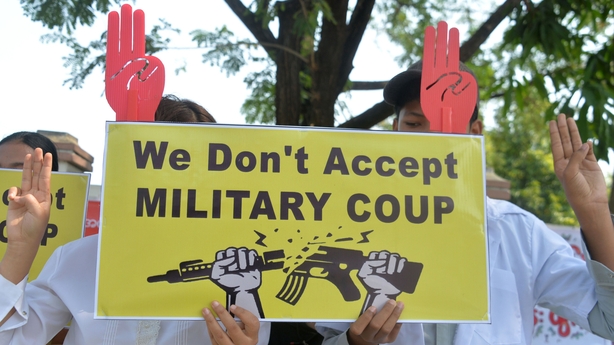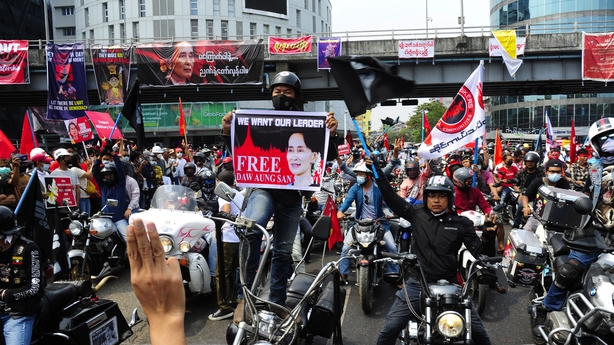A 20-year-old woman who was shot in the head last week during an anti-coup protest in Myanmar's capital Naypyidaw has died, according to the hospital treating her.
Mya Thwate Thwate Khaing, who had participated in a massive protest on 9 February against the coup, is the first official death from the anti-coup movement since the military seized power from Aung San Suu Kyi.
The demonstration in Naypyidaw turned violent when security forces fired rubber bullets on protesters, but doctors at the hospital later told AFP that at least two people had been critically wounded by live rounds.
A hospital spokesperson said staff faced immense pressure since Mya Thwate Thwate Khaing has been in their intensive care unit.
"Some have left the hospital already because of pressure," he said.
Military spokesman-turned-deputy information minster Zaw Min Tun confirmed this week that she had been shot, and said authorities will continue to investigate the case.
Since she was shot, Mya Thwate Thwate Khaing has become a symbol of resistance for protesters, who have wielded massive banners portraying her likeness during demonstrations calling for justice.
Today marks two straight weeks of daily demonstrations against the military's seizure of power.

The protests in towns and cities throughout have been more peaceful than the bloodily suppressed demonstrations during nearly 50 years of direct military rule up to 2011.
But police have fired rubber bullets several times to break up crowds. The army says one policeman died of injuries sustained in a protest.
As well as the daily protests, a civil disobedience campaign has paralysed much government business and international pressure is building on the military.
Police in Yangon sealed off the city's main protest site near the Sule Pagoda, setting up barricades on access roads to an intersection where tens of thousands have gathered this week.
Hundreds of people gathered at the barricades anyway, a witness said, while a procession of several thousand formed at another favoured protest site near the university.

In the northern city of Myitkyina, baton-wielding police and soldiers sent protesters scattering, video on social media showed, after young people waving signs and flags drove around on motorbikes and confronted police blocking some roads.
Britain and Canada announced new sanctions yesterday and Japan said it had agreed with India, the United States and Australia on the need for democracy to be restored quickly.
Myanmar's junta has not reacted to the new sanctions. On Tuesday, an army spokesman told a news conference that sanctions had been expected.
The army seized back power after alleging fraud in the 8 November elections won by Ms Suu Kyi's National League for Democracy party, halting a transition to democracy that had begun in 2011 and detaining her and hundreds of others.
Ms Suu Kyi, 75, faces a charge of violating a Natural Disaster Management Law as well as charges of illegally importing six walkie talkie radios. Her next court appearance has been set for 1 March.

